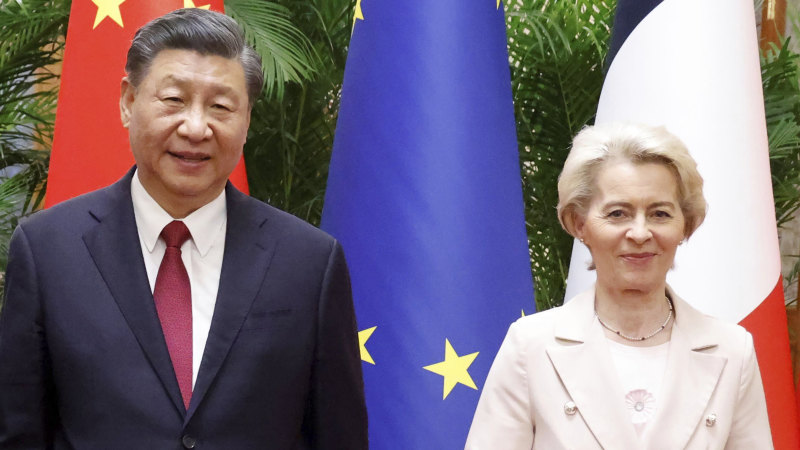Save articles for later
Add articles to your saved list and come back to them any time.
The European Union has launched an investigation into Chinese dumping of government-subsidised electric vehicles.
EU Commission President Ursula von der Leyen made the announcement in her annual State of the European Union address in Strasbourg.
Europe, a global powerhouse in manufacturing combustible engine cars, has been gradually losing the race in producing electric vehicles in the Chinese market to domestic players.
China’s President Xi Jinping, France’s Emmanuel Macron and European Commission President Ursula von der Leyen in Beijing in April.Credit: AP
Von der Leyen said Europe was for competition but only if it was fair and likened it to the loss of Europe’s solar industry to China, which she blamed on Beijing’s unfair trade practices where many young businesses were undercut and pushed out by government-subsidised Chinese companies.
“Global markets are now flooded with cheaper Chinese electric cars,” she told Members of the European Parliament (MEPs).
“And their price is kept artificially low by huge state subsidies.
“This is distorting our market,” she said.
She said Europe would not accept this unfair playing field inside the Union.
“We do not accept this from the outside,” the president, who advocates a policy of “derisking but not decoupling” from China, said.
Employee conducts quality control checks on a Volkswagen AG ID.5 electric sport utility vehicle in Zwickau, Germany.Credit: Bloomberg
“So I can announce today that the Commission is launching an anti-subsidy investigation into electric vehicles coming from China.
“Europe is open for competition. Not for a race to the bottom.
MEPs applauded von der Leyen’s announcement.
Lithuania’s Foreign Minister Gabrielius Landsbergis who has been pushing for the EU and fellow member states to take a tougher line on China told The Herald and The Age it was time to correct the short-sighted approach that had been taken with Beijing.
“For decades, a short-sighted approach allowed China to have an upper hand on our markets and industries,” he said.
“Thus, I welcome Ursula von der Leyen’s timely decision to launch an anti-subsidy investigation into electric vehicles coming from China and a firm stance on de-risking.
“It is our European duty, to prevent the Union from falling into a trap of any sort of dependency from any autocracy ever again.”
But the German Association of the Automotive Industry was more cautious and warned that a possible Chinese reaction should be considered.
“An anti-subsidy investigation alone does not contribute to solving the existing challenges regarding the competitiveness of the European location,” it said.
Although the investigation is in line with recent French requests for Europe to take a harder line on Chinese EVs saturating the market, work on beginning an inquiry has been taking place since the start of the year.
French President Emmanuel Macron wants to produce 2 million hybrid and electric, or zero-emission vehicles by the end of the decade as part of his France 2030 plan.
So far, China’s quest to dominate the electric vehicle market is bearing fruit. This year, homegrown BYD outsold Germany’s VW for the first time. This year it expanded into Europe and Chinese makers dominated the Munich auto show IIA.
Felipe Munoz, senior analyst at JATO Dynamics, a London-based firm which specialises in commercial intelligence for the automotive sector said China’s edge in Europe was still marginal at 6.2 per cent in July.
Around 5 per cent of that was made up in sales by MG which is Chinese-developed, produced and designed but positioned as British.
“Yes they are growing fast – MG actually – but they are still far away from the leaders like the VW Group which has a 22.5 per share and Stellantis with 13.2 per cent share or Tesla at nearly 19 per cent,” Munoz said.
He said Europe needed to find ways to make Chinese electric vehicles less competitive if it wanted to retain dominance like the Biden Administration had done through the Inflation Reduction Act.
“The only way Europe can compete against the power of China is by imposing higher tariffs or incentivising the local production.”
Speaking to this masthead separately to von der Leyen’s speech, Joerg Wuttke, Europe’s chief business identity in Beijing for almost three decades said China’s advances in clean energy were a challenge to his native Germany.
“I always call China the fitness centre when you see to what extent they have developed technologies which they might now export,” he said, in a nod to Beijing’s innovative capacity in the sector.
“For Germany, of course, the car industry comes to mind first and foremost – the batteries, the green technology.
“It is everything where basically we were complacent, arrogant and now it’s payback time.”
Get a note directly from our foreign correspondents on what’s making headlines around the world. Sign up for the weekly What in the World newsletter here.
Most Viewed in World
From our partners
Source: Read Full Article



